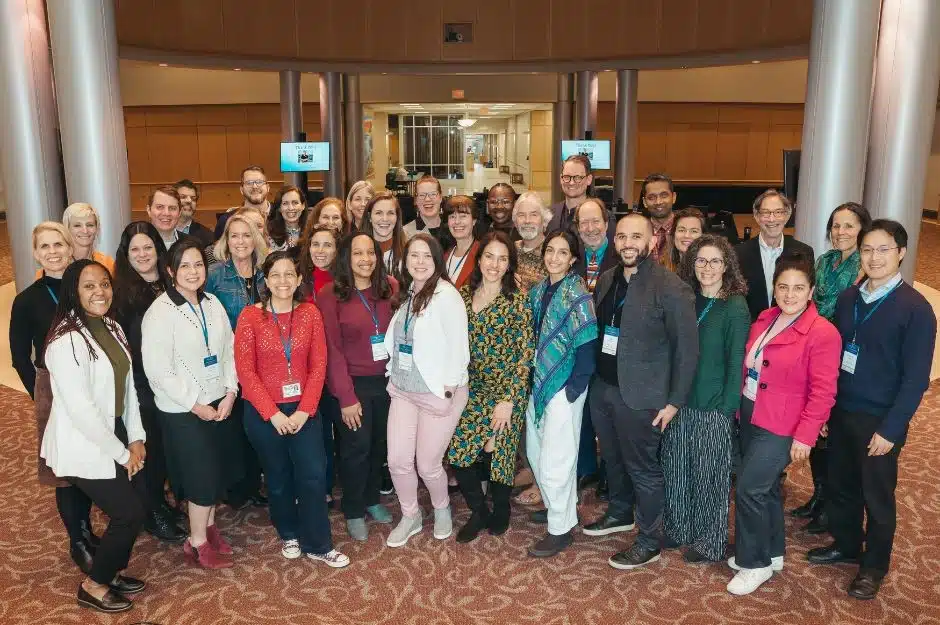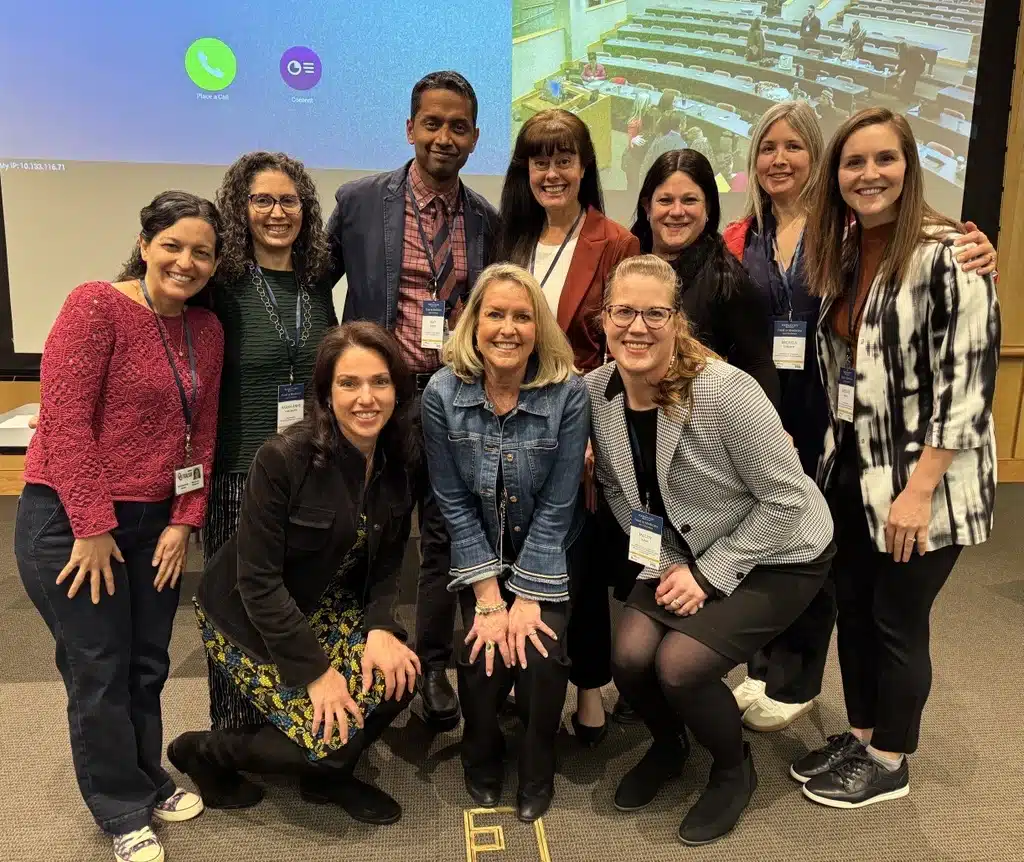ACLM, Aspen Institute event highlights food as medicine for type 2 diabetes treatment and prevention
A white paper summary is planned about the two-day event that highlighted the value of multi-level partnerships between healthcare and community sectors to properly and effectively address type 2 diabetes and other chronic conditions.
By Kaitlyn Pauly
ACLM Chief Integration Officer
February 20, 2025

American College of Lifestyle Medicine (ACLM) was thrilled to partner in January with the Aspen Institute Food & Society team to host the “Food is Medicine and Diabetes Convening.” The two-day event in Tulsa, Okla. showcased innovations at the vital intersection of “clinical” and “community” in advancing Food as/is Medicine (FAM) approaches to treat, prevent, and even achieve remission of type 2 diabetes. This convening was supported through a generous donation from the Ardmore Institute of Health (AIH) and supplemented by the Coretz Family Foundation.
Type 2 diabetes is one of the fastest-growing health conditions in the U.S. and beyond. This burgeoning chronic disease creates human suffering among both adults and children, reduced workforce productivity, clinician burnout, and financial unsustainability for families and the nation as a whole. Something must be done about this preventable, treatable, and reversible problem. Multi-level partnerships between healthcare and community sectors are imperative to properly and effectively address type 2 diabetes and other chronic conditions, and this event shone a bright light on some of those innovative partnerships.
Insights and information shared at the convening will inform the Aspen Institute’s guide on Food Is Medicine for Community Based Organizations. A white paper summary is also planned.
Food bank partnership a key strategy
The event kicked off at the Food Bank of Eastern Oklahoma with a welcome reception, facilities tour and dinner graciously hosted by Chief Culinary Officer Jeremy Johnson and his amazing staff. This tour gave attendees a great understanding of the food bank’s vital role in supporting community-based food assistance and community enhancement initiatives, as well as highlighted some of the innovative ways that the food bank is making a huge impact on the local community. Partnership with local food banks is a key strategy for supporting food assistance in communities, and there are opportunities to enhance the great work that is already underway to improve the health of communities.
Making the healthy choice the easy choice
The second day started with inspirational opening announcements from Executive Director of Food & Society at the Aspen Institute Corby Kummer, Senior Vice President of Ardmore Institute of Health Janet Calhoun, Vice President at University of Oklahoma-Tulsa (OU-Tulsa) Susan Bynum, and ACLM CEO Susan Benigas.
Longstanding ACLM leader and CEO/Co-founder of the non-profit Kellyn Foundation Meagan Grega, MD, FACLM, DipABLM, led the first session showcasing Kellyn Foundation’s diverse set of initiatives that aim to “make the healthy choice the easy choice.” Kellyn offers various community programs for all ages across the spectrum, from prevention all the way to intensive therapeutic lifestyle intervention for disease treatment and remission. Kellyn is also always looking for ways to enhance its FAM/FIM offerings through opportunities like 1115 Medicare waivers as well as by bringing a FAM lens to the local Meals on Wheels program. Dr. Grega also shared how local food systems and farmers can be part of the solution to address food and nutrition security through the creation of food hubs, where there can be sustainable supply and demand, as well as coordinated distribution across various systems/entities within communities.
FAM for special populations
Another long-time ACLM member and Associate Professor of Health Promotion Sciences and Family and Community Medicine at OU-Tulsa Marianna Wetherill, PhD, MPH, RDN/LD, DipACLM, shared her incredible work as the principal investigator of the Nutrition to Optimize, Understand, and Restore Insulin Sensitivity in HIV for Oklahoma (NOURISH-OK) study. The NOURISH-OK study will address important research gaps to inform the development of FAM interventions to support healthy aging for those living with HIV.
Tracking, measuring and paying for food
Katie Ettman of Coding4Food, a community-informed initiative aiming to create new Healthcare Common Procedural Coding System (HCPCS) codes to define a spectrum of FAM interventions, shared the organization’s phased approach to getting food tracked, measured and paid for across the healthcare ecosystem by leveraging HCPCs level II codes. The first phase of this work has been to standardize the language of these food access interventions (medically tailored meals, produce prescriptions, medically tailored groceries and healthy groceries) to present to the Centers for Medicare and Medicaid Services (CMS). The next phase will be to standardize skills-based interventions like culinary medicine training.
The work of Coding4Food is closely connected to the Gravity Project, a national public collaborative that develops consensus-based data standards to improve how we use and share information on social determinants of health (SDOH). Ettman shared two other organizations involved in SDOH work more broadly, including the Partnership to Align Social Care and Sync for Social Needs. You can stay up to date on the work of Coding4Food by subscribing to its email list at here. They also host public calls, which can be accessed here.

Shared medical appointment resources
Shared medical appointments (SMAs) made their debut as a financially viable solution for reaching more patients with FAM interventions efficiently within community-based settings. ACLM President-elect, Michelle Hauser, MD, MS, MPA, FACP, FACLM, DipABLM, Chef, ACLM Board of Directors Member Mahima Gulati, MD, DipABLM, and ACLM Health System Council member Ajay Joseph, MD, FACC, DipABLM, spoke to various aspects of SMAs. Their presentations included the steps needed to stand up a lifestyle medicine SMA in clinical settings, the importance of supportive patient and provider resources like the free culinary medicine curriculum. They also stressed the value of using return on investment and cost savings examples to ensure leadership support for SMAs, especially in value-based payment arrangements. Other SMA resources mentioned included ACLM’s SMA toolkit and free SMA curricula including AIH’s Full Plate Living program for increasing fiber-filled foods, UC San Diego Health’s SLIM program for weight management and ACLM’s LEADR program for diabetes remission.
Lifestyle interventions a necessity with or without GLP-1s
President of the Obesity Medical Association and Chair of ACLM’s GLP-1 Taskforce Lydia Alexander, MD, DipABOM, DipACLM, MFOMA, gave a tour of the complex world of obesity, type 2 diabetes and GLP-1 use. She emphasized the absolute necessity for lifestyle interventions to wrap around and support complex and multi-dimensional lifestyle-related diseases like obesity and type 2 diabetes.
Bolstering local food economies
Dean and Professor of The Gerald J. and Dorothy R. Friedman School of Nutrition Science and Policy at Tufts University Christina Economos, PhD, shared updates on The Delta GREENS (Growing a Resilient, Enriching, Equitable, Nourishing food System) Food is Medicine Project in the Mississippi Delta region. The Delta GREENS FIM Project’s primary goal is to improve health outcomes by bolstering the local food economy and developing an FAM program at the Delta Health Center, which ideally will generate both economic and health benefits for the community. Read more about the project here.
Value of teaching kitchens and culinary medicine
Director of Culinary Nutrition at Harvard T. H. Chan School of Public Health at Harvard University David Eisenberg, MD, highlighted the successes of the Teaching Kitchen Collaborative and the explosion of teaching kitchens across the country and world. Many of the kitchens are in medical schools and health systems. He also highlighted the importance of the recently Proposed Nutrition Competencies for Medical Students and Physician Trainees published in JAMA. Dr. Eisenberg pointed out that the OU-Tulsa campus has the first federally funded teaching kitchen in the nation, which was toured during the event and is led by Dr. Wetherill.
ACLM member Jaclyn Albin, MD, CCMS, DipABLM, showcased the robust culinary medicine program she directs at UT Southwestern, one of the many initiatives she leads. She highlighted several ideas that could support additional FAM solutions, including the use of CTSA funding to support programming or partnering with Cooperative Extension Services to expand educational reach. Her novel approach to community-based SMA delivery at a local church included securing leases for the building space to circumvent Place of Service challenges of delivering healthcare services outside of the clinic walls.
Also featured in the culinary medicine panel was UCLA Associate Vice Provost for the Semel Healthy Campus Initiative Center Wendelin Slusser, MD, MS. During Dr. Slusser’s 30-plus years at UCLA, she has launched many initiatives focused on well-being, including leading one of four academic medical centers taking part in the Teaching Kitchen Research Trial to evaluate the benefits of participating in a teaching kitchen.
Ajay Joseph, MD, FACC, DipABLM, described his leadership of a lifestyle medicine and culinary medicine program aiming to transform patient care at the Saint Francis Health System in Tulsa. Dr. Joseph hopes to demonstrate with research the cost savings associated with a lifestyle medicine approach to care.
Food for diabetes
Director of Nutrition Studies at Stanford Prevention Research Center Christopher Gardner, PhD, known for his involvement in the Netflix Documentary, “You are What you Eat,” offered thought-provoking questions about what science says are the best foods for FAM and diabetes. ACLM offers a FAM for Type 2 Diabetes Remission course to learn more about this topic. New T2D clinical practice guideline coming.
ACLM Senior Director of Research Micaela Karlsen, PhD, MSPH, gave an overview of ACLM’s upcoming clinical practice guideline (CPG), Lifestyle Interventions for Treatment and Remission of Type 2 Diabetes and Prediabetes in Adults. The guideline will support a range of efforts from clinical integration to advocacy and policy change. This new CPG will accompany ACLM’s other type 2 diabetes resources, including CME/CE courses Remission of Type 2 Diabetes and Reversal of Insulin Resistance, expert consensus statements, and the Diabetes Bill of Rights.
ACLM Education Committee Chair Melissa Bernstein, RD, FAND, DipACLM, FACLM, rounded out the event with a description of the role of registered dietitians in the prevention and treatment of type 2 diabetes in both clinical and community care settings.
Power of partnerships
A major takeaway from this convening was the power of partnerships for achieving sustainable, scalable and lasting health outcomes for communities.
Community-Engaged Lifestyle Medicine as a Framework for Health Equity: Principles for Lifestyle Medicine in Low-Resource Settings – PMC is a 2019 publication from the ACLM group now known as the HEAL (Health Equity Achieved through Lifestyle Medicine) Initiative. The published framework, which has been used to guide ACLM’s HEAL efforts, includes the evidence-based principles of community engagement, cultural competency, and application of multilevel and intersectoral approaches.
The conclusion of this framework emphasizes the value of bringing groups together in partnership to solve for today’s chronic disease burden: “Sustainable partnerships boosting capacity of lifestyle medicine practitioners and community-based organizations at the national, regional, and local levels are needed, engaging stakeholders to address upstream causes of poverty and increasing grassroots community momentum and ownership of health-building programs.”